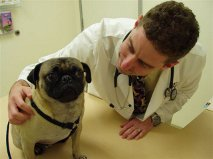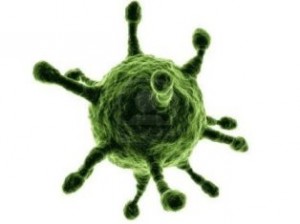For information on infections, look up the specific illness or condition. For general information on ways to help your pet with a minor infection, see the section on Abscesses.
 For moderate to severe infections, and infections that aren’t going away after three days, see a holistic veterinarian. It’s important that the veterinarian you select is trained in fields such as immunology, nutrition, homeopathy, et cetera, and that he or she has an appreciation for holistic medicine, which simply means looking at the whole of a given system instead of focusing on individual parts or symptoms. If you go to a veterinarian who is not trained in these fields, he or she will probably give you antibiotics and maybe some steroids. Conventional veterinary care deals heavily with these drugs and with vaccines, which, unfortunately, have wreaked havoc on our pets’ immune systems. This has caused a major elevation in the instances of a great many diseases that were previously unseen in our dogs and cats.
For moderate to severe infections, and infections that aren’t going away after three days, see a holistic veterinarian. It’s important that the veterinarian you select is trained in fields such as immunology, nutrition, homeopathy, et cetera, and that he or she has an appreciation for holistic medicine, which simply means looking at the whole of a given system instead of focusing on individual parts or symptoms. If you go to a veterinarian who is not trained in these fields, he or she will probably give you antibiotics and maybe some steroids. Conventional veterinary care deals heavily with these drugs and with vaccines, which, unfortunately, have wreaked havoc on our pets’ immune systems. This has caused a major elevation in the instances of a great many diseases that were previously unseen in our dogs and cats.
 In conventional medicine, the distinction between bacterial and viral infections is important because antibiotics, such as penicillin, prescribed to kill bacteria have no effect on viruses. In naturopathy, herbal medicine, and homeopathy, this distinction is not as important because the treatments are usually effective against all sorts of microbes – bacteria, viruses, fungi, and parasites.
In conventional medicine, the distinction between bacterial and viral infections is important because antibiotics, such as penicillin, prescribed to kill bacteria have no effect on viruses. In naturopathy, herbal medicine, and homeopathy, this distinction is not as important because the treatments are usually effective against all sorts of microbes – bacteria, viruses, fungi, and parasites.
We are not against antibiotics or antivirals. They have their place in medicine and are a valuable component of holistic healthcare. We are against the overuse of antibiotics. We are in support of strengthening overall health so that infections are naturally warded off. Overuse of antibiotics depresses your pet’s immune system, causing future infections and disease to occur more frequently, creating a vicious cycle.
Infections can be bacterial or viral, and they are often treated the same way. Antibiotics, however, have no effect on viral infections, unless there is a secondary bacterial infection. For example, if you have the flu, taking an antibiotic doesn’t help. However, if the flu has triggered a bronchial bacterial infection, and you are coughing up green phlegm, then antibiotics will help fight the bacterial infection.
Living things are made of cells. Each cell is a biological machine made up of a nucleus, a cell wall, energy-producing components, et cetera. Bacteria are single-celled organisms that are much simpler. For example, they have no nucleus. They are perhaps 1/100th the size of a human cell and might measure one micrometer long. Bacteria are completely independent organisms able to eat and reproduce. They are sort of like fish swimming in the ocean of your body. Under the right conditions, the average time for a bacteria to reproduce is twenty minutes. Their offspring increase exponentially, enabling one bacterium to become one million in around seven hours.
Antibiotics kill bacteria. Anti means “against” and biotikos means “fit for life.” Antibiotics prevent microorganisms from carrying on all their essential life functions, thereby causing their death.
 A virus is something different altogether. A virus is not really alive. A virus is basically a fragment of DNA in a protective coat. The virus comes in contact with a cell, attaches itself to the cell wall and injects its DNA, and perhaps a few enzymes, into the cell. The DNA uses the machinery inside the living cell to reproduce new virus particles. Eventually the hijacked cell dies and bursts, freeing the new virus particles; or the viral particles may bud off of the cell so it remains alive. In either case, the cell is a factory for the virus.
A virus is something different altogether. A virus is not really alive. A virus is basically a fragment of DNA in a protective coat. The virus comes in contact with a cell, attaches itself to the cell wall and injects its DNA, and perhaps a few enzymes, into the cell. The DNA uses the machinery inside the living cell to reproduce new virus particles. Eventually the hijacked cell dies and bursts, freeing the new virus particles; or the viral particles may bud off of the cell so it remains alive. In either case, the cell is a factory for the virus.
When a virus or bacteria, also known generically as a germ, invades a body and reproduces, it normally causes problems. Generally the invaders’ presence produces a side effect that makes you sick. For example, in humans, the strep throat bacteria, Streptococcus, releases a toxin that causes inflammation in the throat. The polio virus releases toxins that destroy nerve cells, often leading to paralysis. Some bacteria are benign or beneficial. For example, there are intestinal bacteria, also called intestinal flora, which help with food digestion.
Most germs, however, are harmful. Viral and bacterial infections are by far the most common causes of illness. Their dangerousness ranges from mild to life-threatening. For serious infections, you will need the help of a veterinarian, preferably one who has trained in both conventional and holistic medicine. Conventional veterinarians are usually too quick to dole out antibiotics and steroids. Sometimes these drugs are the best treatment, but often they are not. For mild infections, it’s often better to boost your animal’s health as best as you can, and to let their bodies work it out.
The immune system:
- Creates a barrier that prevents bacteria and viruses from entering your body.
- Detects and eliminates viruses and bacteria which have entered the body before they reproduce out of control.
- Fights viral and bacterial invasions which have reached the stage of rampant reproduction.
The immune system has several other important jobs. For example, it can detect cancer in early stages and can eliminate it in many cases.
Generally speaking, boosting your animal’s immune system helps with prevention and recovery of all sorts of diseases. Feeding a healthy diet is the best way to give your pet a healthy immune system. See the Natural Diet page. And for general tips, see Overview, Holistic Veterinary Care, the immune system section of the Infections page, and various other pages in our Ailments A-Z section.
Vitamin C has been a long time infection fighter for good reason. Give at least 250 mg of vitamin C per ten pounds of body weight once a day. Echinacea is also helpful. And goldenseal can be beneficial when there is inflammation or fever. The normal body temperature of a dog or cat is about 101.5°F. Anything below 100°F and above 103°F is cause for concern and you ought to contact your holistic veterinarian.
Antioxidants, which vitamin C is one of, strengthen the immune system. Vitamins A, D, and E are antioxidants, as is zinc. Selenium makes antioxidants more powerful. Dandelion leaves are a good source of antioxidants and other nutrients, as are a variety of greens, fruits, vegetables, and fish oil.
The best way to give Vitamins A and D is in a high quality fish oil. Don’t give too much of any fat-soluble vitamin, such as A, D, or E. Per ten pounds of body weight, give 5 IUs of Vitamin E and a couple of drops of fish oil. As always, it’s best to consult with a holistic veterinarian.
 Grapefruit seed extract may also be helpful as an infection-fighting booster. Give one capsule per ten pounds of body weight twice per day for two days, then once per day for seven days.
Grapefruit seed extract may also be helpful as an infection-fighting booster. Give one capsule per ten pounds of body weight twice per day for two days, then once per day for seven days.
Other supplements which have been reported to strengthen the immune system include B-complex vitamins, garlic, elderberry, noni, astragalus, bee propolis, ashwagandha, and milk thistle. Scientific analysis of milk thistle shows that it contains a flavonoid complex called silymarin, which is a powerful anti-oxidant. Milk thistle is regarded as one of the most important herbal liver tonics and restoratives with its medical use traced back more than two thousand years.
Healthy levels of intestinal flora are essential to good health; they promote white cell reactions against viruses and bacteria. Daily intake of probiotics as a supplement or from kefir or natural yogurt will help repopulate intestinal flora, which is depleted by processed foods and antibiotics.
How to Give Supplements to Your Pet
Some supplements can be added directly to your pet’s food. Capsules can be opened. Tablets and dried herbs can be ground finely with a mortar and pestle. Fresh herbs can be finely minced; this is best done in a food processor. Some pets will eat medicinal food when it’s blended into a smoothie. Don’t add sugar or salt to try to increase palatability. Another method is to roll the supplements into small balls with refrigerated honey. If you use this method, use only raw, organic, unpasteurized, unfiltered honey. Finicky pets may turn their noses up at any of these, however. Some people squirt tinctures directly into a pet’s mouth. If you’ve ever tasted a tincture, however, you know that most of them are very bitter and foul-tasting.
If you have a finicky cat, and you are not fasting the cat, one way to give supplements such as vitamin C is to purée raw, organic liver and mix the powdered supplement into the mushy purée. Some supplements, however, have such a distasteful smell that this may not work with your cat.
The method I prefer to use is to stick a capsule directly into my pet’s mouth. If you do this, don’t be hesitant. And if you have long finger nails, clip them short and keep them filed. You don’t want to scrape the roof of your pet’s mouth. Move quickly and confidently and be prepared. Open the animal’s mouth with one hand, holding the capsule in the other hand. Promptly place the capsule inside the mouth, down near the base of the tongue. Tilt the muzzle upward and rub your palm up and down under the pet’s chin, sort of like you’re massaging the capsule down the throat. When you do this as one swift, confident move, your pet won’t even know what happened. Then give a natural treat afterward, as long as your pet isn’t on a fast.
If the infection is on the skin, and is minor, and there is fur in the area, shave it. Disinfect as best as you can with povidone-iodine (Betadine). Depending on the situation, you may choose to apply a poultice, which is an age-old, tried and true remedy for drawing out pus and removing unwanted substances from the skin. See the information on poultices in the First Aid section.
For information on analgesics, see Pain Relief on the First Aid page.